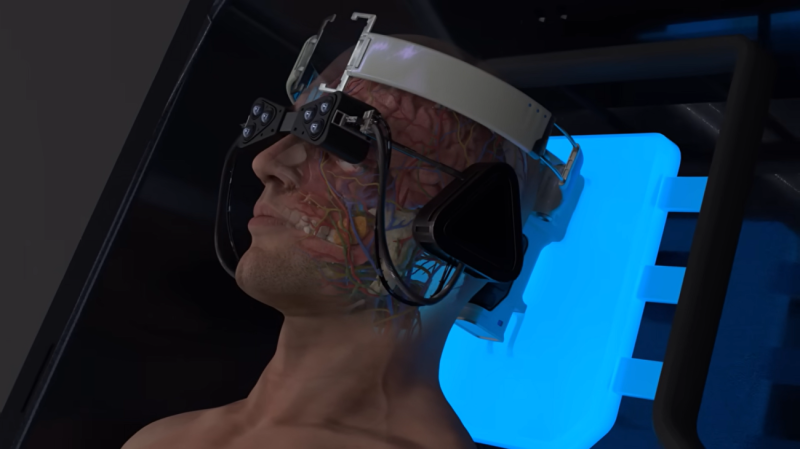
DR – YouTube Hashem Al-Ghaili Screenshot of the Cognify project presentation video – YouTube.
What if, instead of locking up criminals, we implanted artificial intelligence-created false memories into their brains to change their personalities before sending them back into society& ;nbsp;? This is the insane project of Hashem Al-Ghaili, the Yemeni molecular biologist who conceptualized Cognify, the prisons of the future.
It is not uncommon for science fiction to inspire today's ideas on defense and security. In this case, the Cognify project does not have to blush in front of the strangest episodes of Black Mirror, nor even in front of Minority Report or again Total Recall.
Rehabilitation, without going through the box prison
Prison overcrowding, recidivism rates, loss of income for society… Today’s prisons do not seem capable of curbing crime, much less rehabilitating those who spend time there. The question arises: how can we do otherwise??
This is where Cognify comes in. Presented at length and in detail in a YouTube video published on Hashem Al-Ghaili’s channel, it is supposedly a project of “rehabilitation rather than punishment”. Let’s summarize.
In theory, the idea is simple: remove the desire to (re)do harm to any individual by injecting them with realistic, artificially generated memories capable of triggering regret, empathy, and even pain. Let's say that a person X murdered Y. After justice has found him guilty, X could choose his punishment: spend the rest of his life in prison (let's simplify), or accept the fate of the machine. Let's say that he chooses the second option. He then undergoes “a high-resolution brain scan to create a detailed map of his neural pathways.” Said map will make it possible to intervene specifically in the regions concerned, such as the hippocampus, which plays a central role in memory and spatial navigation. Then, it's the fateful moment:
His kind of helmet, he imagines it compact enough to be able to be used anywhere in the world, in almost any situation. Especially since the device would be strong with a foolproof battery.
After that, because these memories are supposed to be permanently integrated into the neural system of the person's brain, X must come out completely shaped, rehabilitated for society, and emptied of all personal data useful to science.
Between science and fiction
As reported by ActuaLitté, “Al-Ghaili emphasizes that the science necessary for this technology already exists.” It’s hard to be certain, even if research related to memories continues to open new avenues for innovation.
On March 27, 2024, a study published in the journal Nature shows that the creation of a memory takes place in pain, in a way. As can be read in an article from Sciences et Avenir, “the neuronal activity during the formation of a memory would be so strong that it would cause DNA breaks in all the neurons involved, triggering an inflammatory response”. Afterwards, the regions thus injured would leave the DNA temporarily more accessible, the time for the natural repair to take place. The latter would leave a sort of trace called an “engram”, which would link the neurons together, so that they can react together to the next occurrence.
In short, we could therefore imagine that by provoking ultra-realistic memories in the brain of an individual, we would indeed have the possibility of radically changing their behavior, or even their identity. It goes without saying that the mere mention of the project has triggered an outcry, particularly over the ethical questions it raises.
A model of society
In the presentation video, Hashem Al-Ghaili is not a little proud to present Cognify as revolutionary. By reducing the need for incarceration to almost nothing, the concept would save a significant amount of funds, used in particular for the construction of prisons, staff or even the care of prisoners.
” The funds saved by reducing incarceration and recidivism rates could be reallocated to other essential areas. This could be education, health, infrastructure development, social protection programs or research and development initiatives that benefit society as a whole,” the biologist boasts, even assuring that it could thus treat post-traumatic stress disorder (PTSD).
What does the people want?? Let's face it, there is a question prior to all this, yet totally hidden in the presentation: justice. If it is not the capital punishment of yesteryear, relying on Cognify treatment could prove just as definitive for oneself, and troubling for society. After all, it is another way of walking straight. And, while Al-Ghaili promises to treat all kinds of impulses, it would be good to know who will set the rules the day this kind of tool is in service.
At no time do we speak of safeguards, any more than of reason. A priori, those who would like to rely on Cognify to be changed from the inside will therefore have to accept being able to be shaped as desired for the good of society.
You liked the article ? It mobilized our editorial staff who only live on your donations.
Information has a cost, especially since the competition from subsidized editorial staff requires increased rigor and professionalism.
With your support, France-Soir will continue to offer its articles for free because we believe that everyone should have access to free and independent information to form their own opinion.
You are the sine qua non condition for our existence, support us so that France-Soir remains the French media that allows the most legitimate to express themselves.

